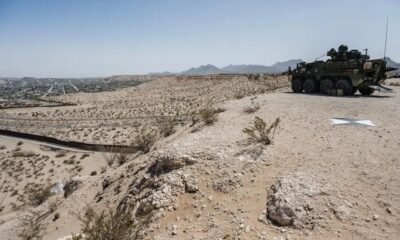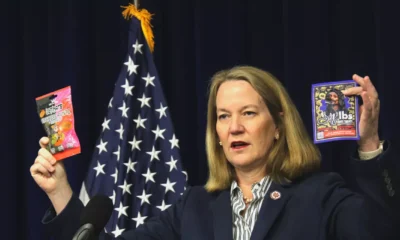Entertainment
Judge Upholds Lithium Drilling Moratorium, Securing Victory for Hualapai Tribe

A federal judge has extended a temporary halt on exploratory drilling activities for a lithium mining project near the Hualapai Tribe’s sacred site, Ha’Kamwe’. The decision comes after the court concluded that irreparable harm from the drilling is likely.
Judge Diane Humetewa noted the importance of lithium exploration in the context of the U.S. transition to renewable energy sources. Yet, she emphasized that this interest does not outweigh the potential harm to Ha’Kamwe’, which is integral to the lifeways of the Hualapai Tribe. “This Court finds that irreparable harm from the Phase 3 drilling project is not just potential; it is likely,” she stated.
The Big Sandy Valley Lithium Exploration Project, spearheaded by a subsidiary of an Australian mining company, aims to drill and test over 100 sites on U.S. Bureau of Land Management (BLM) land surrounding significant cultural properties of the tribe.
For years, the Hualapai Tribe has expressed concerns regarding the project but faced challenges as the BLM determined that any disruptions would be temporary and insufficient to block the endeavor. “We’re pleased with how everything turned out with this decision,” remarked Ka-voka Jackson, director of the Hualapai Department of Cultural Resources. “It feels like we’re being heard.”
Jackson underscored the significance of the judge’s ruling, which validates long-held concerns regarding the potential impact on cultural heritage and water resources. “We want to protect these sacred places, not only for us but for the future,” Jackson emphasized.
Laura Berglan, a senior attorney for Earthjustice representing the tribe, expressed satisfaction with the court’s recognition of threats to the tribe’s resources. She reaffirmed their commitment to continue challenging the project as legal proceedings progress. “We’re glad the court rejected BLM’s 19th-century mindset, that the company gets whatever they want at the expense of Indigenous communities,” Berglan stated.
Hualapai Tribal Chairman Duane Clarke conveyed a sense of relief but acknowledged that this ruling is merely a step in a larger battle. “Our people have used Ha’Kamwe’ for centuries for healing, prayer, and rites of passage,” he said. “We are absolutely determined to protect our sacred waters.”
The Ha’Kamwe’ spring, located within the Hualapai Tribe’s Cholla Canyon Ranch property, is recognized as a traditional cultural property. It is eligible for listing on the National Register of Historic Places. The tribe’s lawsuit claims the project’s approval breaches the National Environmental Policy Act (NEPA) and the National Historic Preservation Act (NHPA).
The legal action demands BLM compliance with NEPA and NHPA, requiring a comprehensive evaluation of the environmental impacts and consideration of alternatives that would minimize harm to Ha’Kamwe’. The suit alleges that BLM moved forward without fully considering viable alternatives or taking necessary mitigation measures.
In light of concerns over Ha’Kamwe’, the Hualapai Tribe has consistently engaged in public consultations, submitted comments, and voiced worries during the planning phases of the lithium project.
Big Sandy, Inc., the project’s leading subsidiary, sought approval from BLM since 2019. Although Arizona Lithium, the parent company, is not directly named in the lawsuit, it has sought to intervene. The court granted this request, enabling the company to defend its interests in the ongoing legal proceedings.
The BLM’s authorization permits drilling and testing of up to 131 exploration holes across 21 acres of public land, aimed at assessing the feasibility of a large-scale lithium mining operation.


















